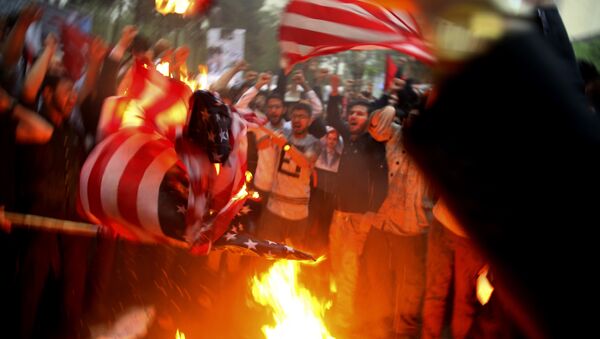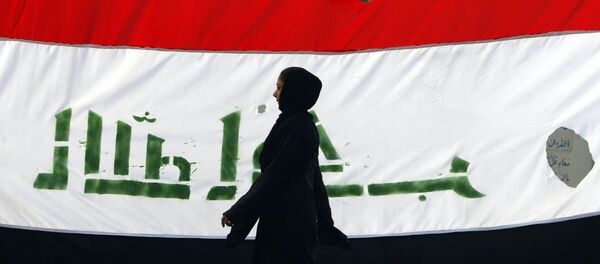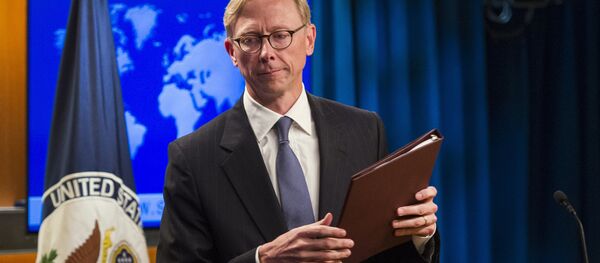Sputnik discussed the Iranian Action Group with Omid Shams, a PhD Candidate at the University of Portsmouth's School of Law.
Sputnik: The National Iranian American Council slammed the establishment of the Iran Action Group, calling it an attempt to enforce Pompeo's dangerous vision for Iran. To what extent would you agree or disagree with this assessment? How could the creation of such a group exacerbate already existing tensions?
READ MORE: Tehran Accuses US of Attempt to Overthrow State Amid Iran Action Group Creation
Now it seems that Iran affairs are going to be somehow addressed under one single management team. I think it's important because the US diplomatic strategy towards Iran might actually lead to intelligence and military confrontation.
The most predictable response on the part of Iran will be to launch intelligence warfare or intensify its proxy warfare against the US and its allies in the region or even military provocations in the Persian Gulf. I think Iran is in no position to respond otherwise to economic or diplomatic retaliation. I believe it sends a very disturbing message to Iran; in Iran's view, it would appear that the US has established a war room to confront Iran.
READ MORE: Iran Not a Pushover and Will Never Become a US Vassal State - Analyst
Sputnik: You spoke of conflicting interests when this was not unified into one working group. Were there softer positions towards Iran prior to the formation of this group from some of the organizations that have now become a part of it?
Omid Shams: Not actually softer positions but mostly somehow contradicting positions. For example, you would've heard some statements from the military commanders regarding Iran's military capability or a potential confrontation with Iran and then you would have different statements from the State Department...
Now it seems to me that the White House is trying to create one single unified position that actually coordinates all the matters regarding Iran, especially to respond to any reaction on the side of Iran when it comes to imposing the sanctions, so it's not basically a harder position, they're trying to actually create a unified voice to address the Iranian affairs.
Omid Shams: Absolutely, yes, I believe so, I think there will be a more aggressive position towards Iran and mostly towards the US allies who are not willing to comply with the US sanction and the US strategy towards Iran, and most importantly it shows that this bill is somehow a decision on the part of the White House to somehow strengthen their position, mostly towards their allies, in order to bring them in line with this strategy.
READ MORE: Spanish Company Vows to Defy US Sanctions, Continue Business With Iran
Sputnik: Do you see the Iran deal (JCPOA) continuing without the United States? Do you think that the pressure on the other countries and the possibility of them facing sanctions if their companies, their corporations continue to cooperate with Iran, is that going to be a deal-breaker? And how motivated is Iran at this point to continue with the terms of the JCPOA?
Omid Shams: I think that there are two different sets of issues here, political issues and economic issues. On the side of the political issues, the Iranians are willing to stay with the deal because it gives them a better position within the international community, to present themselves as the good guys who are still complying with the deal.
However on economic issues, it seems that the EU is only showing dismay towards sanctions in rhetoric but in practice, there is no legal status, no provisions in the EU to force the companies to do business with Iran. So I think none of the major companies are willing to risk their business relations with the US by staying in Iran's market.
Another issue is that Trump is already in an all-out trade and economic war with the EU, China, Russia and recently Turkey. So this would, of course, affect the US first in bringing these major players in line with its strategy towards Iran. So Iran would invest in those tensions in order to actually gather support from these major powers, in order to secure some sort of lifeline for two years, and then they will look at the results of the next US presidential election.
The views and opinions expressed by Omid Shams are those of the speaker and do not necessarily reflect those of Sputnik.



